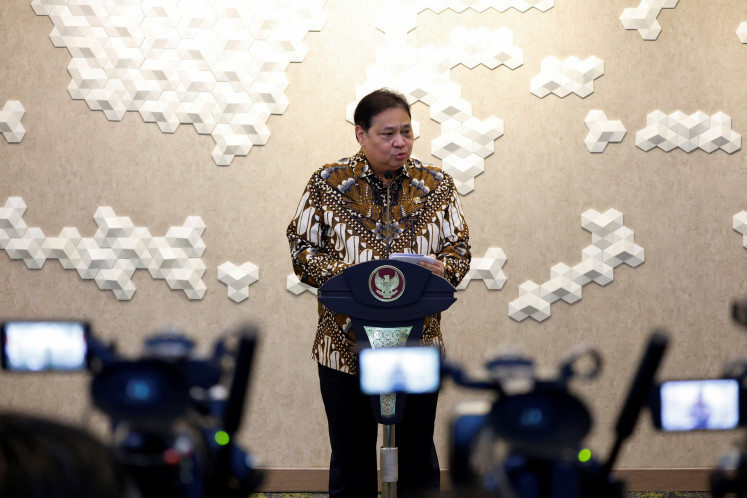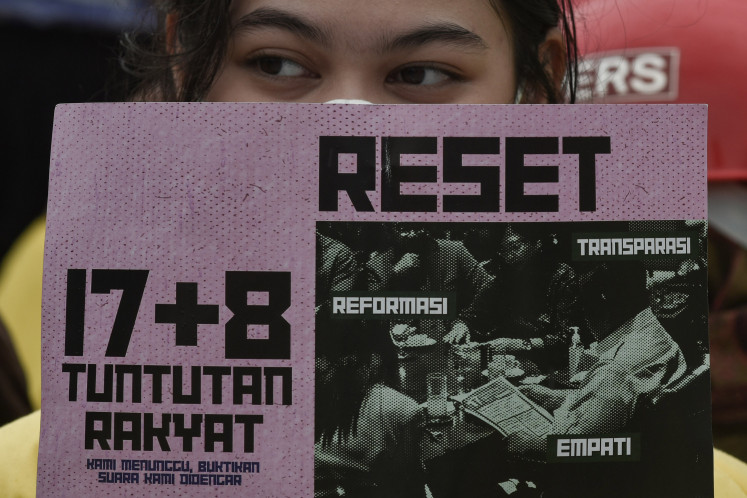Popular Reads
Top Results
Can't find what you're looking for?
View all search resultsPopular Reads
Top Results
Can't find what you're looking for?
View all search resultsRI takes Indian advice on migrant workers
Research has found that in the formal sector, Indian migrant workers are more desirable and secure around the world than Indonesian migrant workers
Change text size
Gift Premium Articles
to Anyone
R
esearch has found that in the formal sector, Indian migrant workers are more desirable and secure around the world than Indonesian migrant workers.
“Around 80 percent of how India builds its systems, manages [its migrant workers], does its job as a regulator and how its private sector operates are similar to those in Indonesia,” Indonesian Manpower and Transmigration Minister Muhaimin Iskandar said Monday.
He spoke to The Jakarta Post after meeting with his Indian counterpart, Overseas Indian Affairs Minister Vayalar Ravi at his office.
“The differences, however, included the fact that the number of [Indian] migrant workers stands at 25 million, while ours only number 6 million,” said Muhaimin.
He also noted that the ratio of Indian migrant workers in the informal sector to those in the formal sector “is 50:50, while we are still dominated by informal sector workers, which make up 70 percent of the total”, he said.
He also said the Indian government provided incentives to its migrant workers, who had changed their nationalities to entice them “home”.
“The more magnificent thing is that they offer property incentives to workers who have switched their citizenship,” he said.
During the meeting, Muhaimin said he and his Indian counterpart also discussed how to collaborate in protecting migrant workers employed in the same countries.
“We are learning how we can cooperate to protect our migrant workers overseas, say in Saudi Arabia, where many Indonesian and Indian migrant workers are employed,” he said.
He said the two governments could share information about their migrant workers as part of the future cooperation that would be laid out in a memorandum of understanding.
But the details of the cooperation were yet to be formulated by both parties, he said.
Indonesia is among a few countries that supply migrant workers, mainly to Malaysia, South Korea, China, Hong Kong, Japan and the Middle East.
Many Indonesian migrant workers receive low pay, are physically and sexually abused or even killed, which has increased domestic pressure on the government to better protect migrant workers.
Despite the Indonesian government calling on the leaders of countries employing Indonesian workers to provide protection to migrants, Indonesia has not ratified the United Nations’ convention on migrant workers’ protection.
Despite widespread complaints against migrant worker recruitment companies here for using the workers as cash cows both legally and illegally, the government has failed to take action against the companies.
Saudi Arabian foreign worker recruitment firms have gone so far as to stop hiring Indonesians due to the high charges associated with Indonesian recruitment agencies.
The Riyadh Chamber of Commerce and Industry held a vote in May, with 98 percent of Saudi recruitment firm owners supporting a total ban on recruiting Indonesians even though any such restriction would hurt them.
Ravi, who on Sunday arrived in Jakarta from the Philippines, is on a two-day visit and is heading to Bali.
He met “the Indian community” in Gandhi Memorial International School, Jakarta.
“The purpose of the visit is to meet the Indian community and government officials to discuss problems Indians face,” he told the Post at the school.
During his speech at the school, he also reinforced the relevance of the teachings of Nobel Peace Prize laureate Mahatma Gandhi in the world these days.
“[The UN] declared Oct. 2 as the birth of Mahatma Gandhi as the Day of Non-Violence,” Ravi said.
“It calls upon the people of the world and the nations observe non violence. At least for one day you take a pledge, we live as a non-violent nation.”










